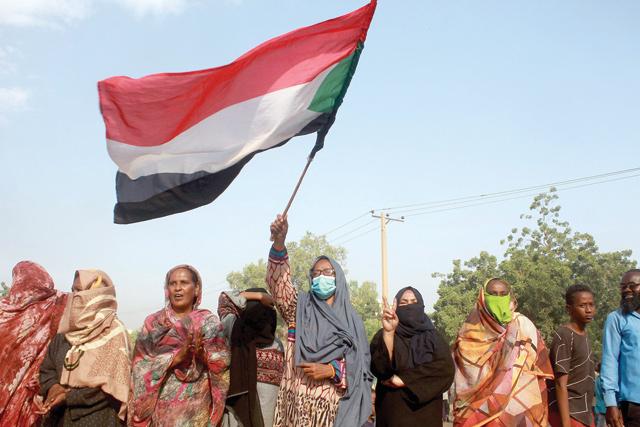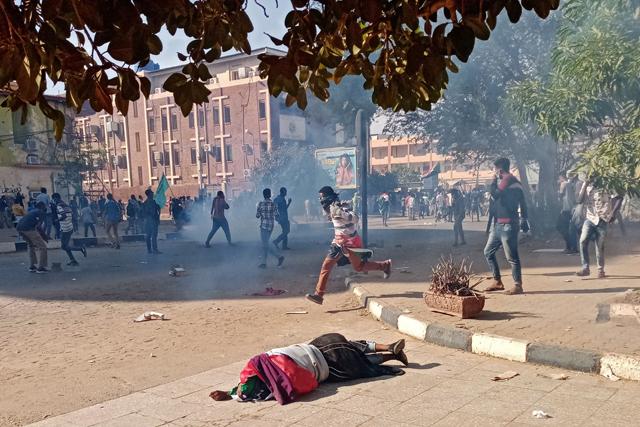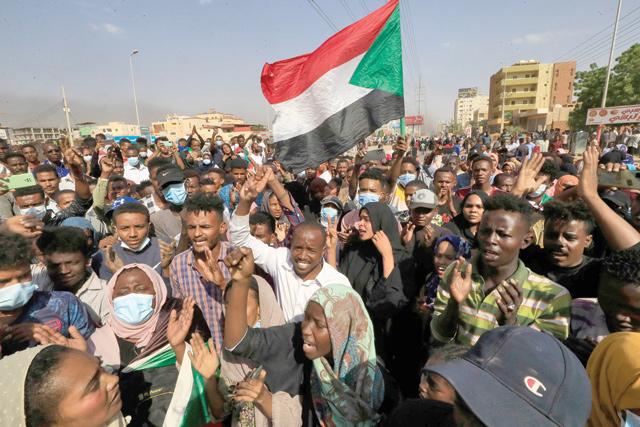You are here
Sudanese stand ground in protests against coup
By AFP - Oct 26,2021 - Last updated at Oct 26,2021

Sudanese protest against a military coup that overthrew the transition to civilian rule, on Monday, in Al Shajara district in southern Khartoum (AFP photo)
KHARTOUM — Angry Sudanese stood their ground Tuesday in street protests against a military coup which has been condemned internationally, and raised fears for the fate of its civilian prime minister.
But at a news conference on Tuesday the country's top general Abdel Fattah Al Burhan said Prime Minister Abdalla Hamdok, an international economist who had carved an image as a champion of good governance, was "at my home" and "in good health", able to return to his own house "when the crisis is over".
UN Secretary General Antonio Guterres called Tuesday for the immediate release of Hamdok, who was detained in a military coup.
Hamdok "must be released immediately", Guterres told a press conference as the UN Security Council prepared to hold an emergency meeting on the putsch in Sudan.
On Monday soldiers detained Hamdok, his ministers and civilian members of Sudan's ruling council, who have been heading a transition to full civilian rule following the 2019 overthrow of Omar Al Bashir.
Guterres said "geopolitical divides" were preventing the Security Council from taking strong measures as countries around the world grapple with the pandemic and social and economic problems.
"These factors are creating an environment in which some military leaders feel that they have total impunity, they can do whatever they want because nothing will happen to them," Guterres said.
“My appeal is for especially the big powers to come together for the unity of the Security Council in order to make sure that there is effective deterrence in relation with this epidemic of coups d’etat,” he said.
“No to military rule”, “The revolution will go on” and “Returning to the past is not an option”, protesters chanted, a day after the armed forces seized power and shot dead at least four people.
Burhan’s declaration of a state of emergency and dissolution of the government provoked an immediate international backlash.
The United States, a key backer of Sudan’s transition, strongly condemned the military’s actions and suspended hundreds of millions of dollars in aid.
The UN demanded Hamdok’s “immediate release”, while diplomats in New York told AFP the Security Council was expected to meet to discuss the crisis on Tuesday.
Announcing the state of emergency on Monday, Burhan said the army took action “to rectify the revolution’s course”.
Sudan’s ambassadors to Belgium, France and Switzerland did not see it that way. They announced their defection on Tuesday.
They condemned the coup and declared their diplomatic missions as “embassies of the Sudanese people and their revolution”, according to the information ministry.
Despite the previous day’s deadly violence, protesters remained on the streets of Khartoum overnight and into Tuesday.
Shops around the capital were shuttered following calls for a campaign of civil disobedience.
“We will only leave when the civilian government is restored,” said 32-year-old demonstrator Hisham Al Amin.
‘Betrayal’
Clashes erupted in Khartoum after Burhan’s speech on Monday.
Internet services were cut across the country and roads into Khartoum were shut, before soldiers stormed the state broadcaster in the capital’s twin city of Omdurman.
It was the latest coup in one of the world’s most underdeveloped countries, which has experienced only rare democratic interludes since independence in 1956.
Analysts said the generals are trying to maintain their historic control.
Demonstrators blocked streets with burning tyres and bricks, and marched waving the Sudanese flag and chanting anti-coup slogans.
The information ministry said soldiers “fired live bullets on protesters... outside the army headquarters”.
Along with at least four deaths, at least 80 demonstrators were wounded, said the independent Central Committee of Sudan Doctors.
US Secretary of State Antony Blinken expressed concern over the reported use of live ammunition against protesters.
State Department spokesman Ned Price said US officials had been unable to contact the prime minister.
A troika of countries previously involved in mediating Sudanese conflicts, the US, UK and Norway — said “the actions of the military represent a betrayal of the revolution, the transition, and the legitimate requests of the Sudanese people for peace, justice and economic development”.
UN Secretary General Antonio Guterres said the detention of the civilian leaders was “unlawful” and condemned “the ongoing military coup d’etat”.
The European Union, African Union and Arab League also expressed concern.
Divisions
Bashir, who ruled Sudan with an iron fist for three decades, is in jail in Khartoum following a corruption conviction.
He is wanted by the International Criminal Court on charges of genocide over the civil war in Darfur.
A 2019 power-sharing deal after his fall saw Sudan ruled by a Sovereign Council of civilian and military representatives tasked with overseeing a transition to a full civilian government.
In recent weeks, the cracks in the leadership had grown wide.
Days before the coup, two factions of the movement that spearheaded demonstrations against Bashir protested on opposite sides of the debate.
One group sought military rule but critics said that call was being driven by the military and security forces. The other camp sought a full handover of power to civilians.
Tensions have long simmered within the movement, known as Forces for Freedom and Change, but divisions ratcheted up after what the government said was a failed coup on September 21 this year.
Burhan had dismissed as “slander” suggestions that the army was involved in that manoeuvre.
The mainstream FFC appealed on Monday for a nationwide campaign of “civil disobedience”.
Analysts have expressed concern that resistance to the coup could be brutally repressed.
“The military will have little option but to crush it by force,” said Magdi el-Gizouli of the Rift Valley Institute.
Related Articles
KHARTOUM — Sudan's coup leader Abdel Fattah Al Burhan on Wednesday dismissed the last civilian members of his ruling body as part of a power
KHARTOUM — Tens of thousands of Sudanese protesters rallied Sunday to mark three years since the start of mass demonstrations that led to th
KHARTOUM — Sudan's top general declared a state of emergency, dissolved the authorities leading country's democratic transition, and announc













